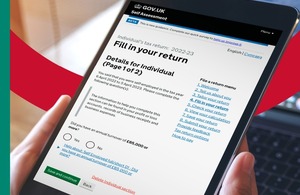It’s time to register for Self Assessment, says HMRC
Registering for Self Assessment is an essential requirement for people with an untaxed income.

HM Revenue and Customs (HMRC) is reminding anyone who is new to Self Assessment for the 2022 to 2023 tax year that they have just 2 weeks until 5 October to tell HMRC and register.
New Self Assessment customers could be someone who has set up a side hustle to earn money in addition to their PAYE job or disposed of cryptoassets; they may be newly self-employed or a new landlord renting out property. Whatever the circumstances, if a customer has any income that they have not already paid UK tax on, they need to register for Self Assessment.
Customers can use HMRC’s online checking tool on GOV.UK to quickly assess whether they will need to complete a tax return. And they can use the step-by-step guide to check what they need to do to file their first Self Assessment tax return.
Myrtle Lloyd, HMRC’s Director General for Customer Services, said:
If you are new to Self Assessment and unsure how the process works – HMRC is here to help. We have a wealth of resources and guidance available on GOV.UK to help customers register, sign up to the online services and complete their tax return. We want to help customers get their tax right first time, just search ‘Self Assessment’ on GOV.UK to find out more.
Customers can register for Self Assessment on GOV.UK. They will then receive their Unique Taxpayer Reference, which they will need when completing their return.
The deadline for customers to file their tax return online and pay any tax owed for the 2022 to 2023 tax year is 31 January 2024. And last year, 96% of customers filed their return online.
Filing online means customers don’t have to complete it all at once, they can save their progress and finish it later and have that added reassurance that HMRC has received their form when they press submit.
HMRC has a wide range of resources to help customers file a tax return including a series of video tutorials on YouTube and help and support guidance on GOV.UK. HMRC has produced 2 videos to help customers registering online for Self Assessment these are for those who are self-employed and those who are not self-employed.
How do I register online for Self Assessment if I’m self-employed?
How do I register online for Self Assessment if I’m not self-employed?
If customers think they no longer need to complete a Self Assessment tax return for the 2022 to 2023 tax year, they should tell HMRC before the deadline on 31 January 2024 to avoid any penalties or needing to complete a tax return. HMRC has produced 2 videos explaining how customers can go online and stop Self Assessment if they are self-employed and those who are not self-employed.
How to go online and stop Self Assessment if you’re self-employed
How to go online and stop Self Assessment if you’re not self-employed
Customers need to be aware of the risk of falling victim to scams and should never share their HMRC login details with anyone, including a tax agent, if they have one. HMRC scams advice is available on GOV.UK.
Further information
More information about Self Assessment
More information on Crypto guidance
You must tell HMRC by 5 October if you need to complete a tax return and have not sent one before. You could be fined if you do not. You can tell HMRC by registering for Self Assessment.
The deadlines for tax returns for 2022 to 2023 tax year are 31 October 2023 for paper returns and 31 January 2024 for online returns. The quickest and simplest way to file a tax return is online. Customers who chose to file by paper can find out how to request a paper return via GOV.UK. We no longer automatically issue paper returns unless there’s a reason a customer can’t file online.
Customers can use the HMRC app to find out how to register for Self Assessment, check their Unique Taxpayer Reference, any PAYE income details and pay their tax bill.
Customers need to be aware of the risk of falling victim to scams and should never share their HMRC login details with anyone, including a tax agent, if they have one. HMRC scams advice is available on GOV.UK.